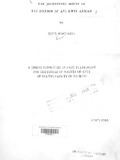| dc.description.abstract | In their depiction of the social, political and economic
realities of the continent, the majority of Africa's writers
tend to follow a chronological order of those events that
have gone into making Africa's history, Chinua Achebes
works,for in stance move from a potrayal of traditional
African society in Things Fall Apart to the era of nationalism
in No Longer at Ease finally the depiction of post-independent
Africa in A Man Of The People and Anthills of
the Savannah.
The writings of Ayi Kwei Armah defy this tradition. If for
nothing else, they are unique for the way in which the
writer abuses the tradition of following the Gregorian
calendar to discuss the events and periods that make up
African history. Thus we find that Armahs first novel The
Beutiful Ones Are Not Yet Born is set in post-independent
Ghana. Two Thousand Seasons which is Armahs fourth novel
takes a large sweep from the unrecorded history of Africa
through traditional African societies, slavery, colonialism
and finally to neo-colonial Africa. Armahs latest work, The
Healers, is set in traditional African society, highlighting the
fall of the Ashanti empire in the nineteenth century,
It is in this way that Armah, the writer, feels free to
transverse the canvas of Africa's past, backward and
forward. This is where the idea of Armahs journeys comes
from. The fact that they are repeated severally, both within
and across the texts, raises them to the level of a motif: a
symbol that draws attention to itself primarily because of its
dominance. The motif is made even more significant because
it stands for something other than itself. In this sense we
analyze Armahs journeys as commentaries on social
situations.
Indeed, Armahs journeys back and forth across African
societies help him to create a moral picture of present-day
society. At the same time, these journeys allow the writer to
seek [or reasons and solutions in the past as much as in the
present. This narrative technique results in the creation of
myths which are made tenable in the past and relevant to
the present and future. The myths then have a seeming
universality, they transcend the geographical and ethnic
boundaries that currently divide the continent. This
universality also relates to time, for myths can be seen to
hold true in the past, the present and the future. Armahs
seeming recourse to the past helps him to merge time and so
to abstract it.
The overall effect of the myths is the creation of unity. It is
a unity between all African states and more importantly,
between black people the world over. The general conclusion
is that Armah urges the use of indigenous methods in the
resolution of current contradictions. Through his myths,
Armah has been able to offer the social philosophy of black
people and he urges its application to the moral rearmament
that African societies need. By so doing, Armah casts aside
Western ideology and practice as a means of offering black
societies any meaningful social reform.
It is important for us to note how Armah leads up to the
assertion that only collective action by the people can bring
about the total transformation of a people. Thus we observe
the disappearance of the lone activist-protagonist who
colours Armahs first three works. In his place emerges a
core of unite d people dedica ted to social reform. I t is
through the concerted efforts of these, characters in Two
Thousand Seasons and The Healers that Armah tries to chart
a moral course for the continent. | en |

